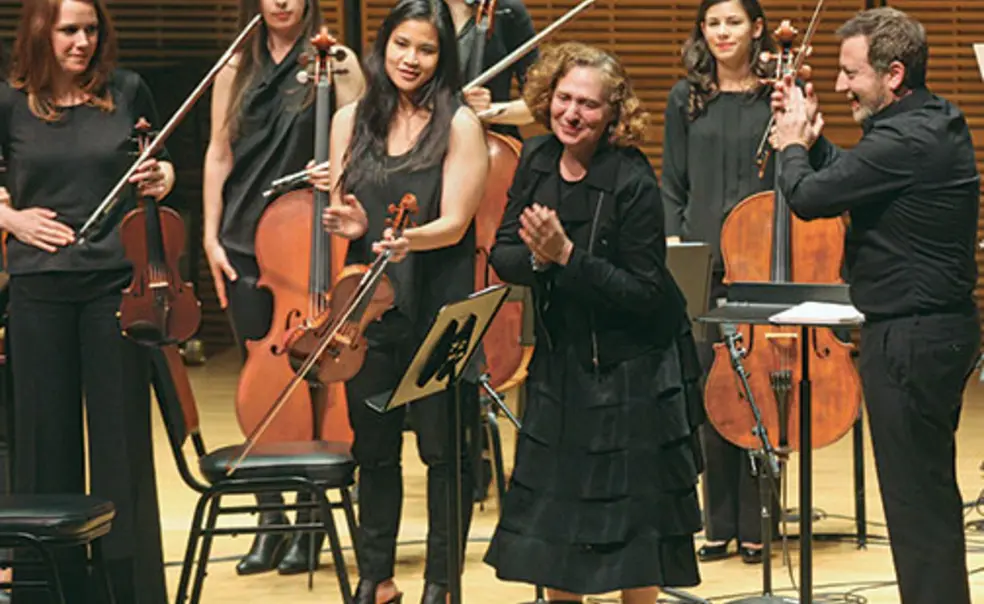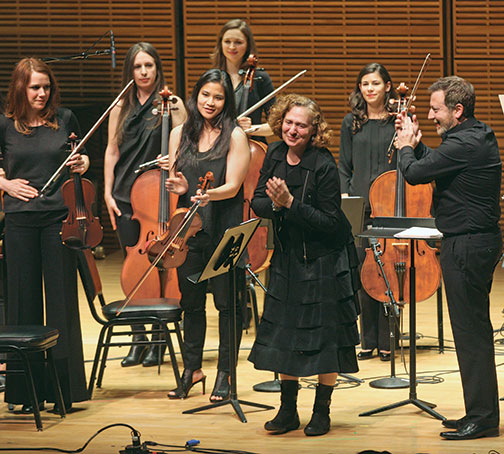Julia Wolfe *12: Musical Innovator
An award-winning musician breaks new ground while exploring American history
As an undergraduate at the University of Michigan, Julia Wolfe *12 studied the social sciences, taking classes in anthropology and politics. Today, her interest in different cultures is evident in both her eclectic musical style — which incorporates elements of classical music, rock, jazz, folk, and pop — and her choice of subject material, which for the past several years has focused on American history and labor rights.
Wolfe’s bold, intense compositions have “long inhabited a terrain of [their] own,” says The Wall Street Journal, “a place where classical forms are recharged by the repetitive patterns of minimalism and the driving energy of rock.”
Her goal, she says, is to “tear down the walls” between the folk, classical, and rock genres. She currently is exploring themes in American history because she is fascinated by how people lived during the Industrial Revolution and how their lives have shaped our identity.
Her 2009 alternative-folk album Steel Hammer was inspired by the ballad about folk-hero John Henry, who, according to legend, hammered a steel drill into rock faster than a steam-powered drill. To write the piece, Wolfe studied more than 200 versions of the song, including recordings by Johnny Cash and Bruce Springsteen. The result, according to The New York Times, is a “wild hybrid” that includes electric guitar, banjo, mountain dulcimer, jaw harp, humming, and chanting.
To research her most recent work, Anthracite Fields, which traces the history of coal miners in central Pennsylvania, Wolfe made frequent field trips to the area to interview descendants of coal miners, visit museums, and explore the mines. For an upcoming piece, Wolfe is researching the lives of female factory workers.
Wolfe writes the text of a composition first, and then finds the musicality in the language. “The text will suggest a rhythm or a color,” she says. She has collaborated with playwright Anna Deavere Smith and architects Diller Scofidio + Renfro, and won an Obie Award for a theater score in 2001.
Growing up in Pennsylvania, Wolfe studied piano and folk guitar, and sang in college. After earning a master’s degree from the Yale School of Music, she met Princeton music professor Steve Mackey, who encouraged her to pursue a Ph.D. in composition at the University. Wolfe enrolled in 1989 but left two years later for a Fulbright scholarship in the Netherlands. She worked as a composer for nearly 20 years before returning in 2009 to complete her dissertation.
Today, Wolfe is an assistant professor of music composition at New York University and serves as co-artistic director of Bang on a Can, a collective she co-founded in 1987 that promotes up-and-coming, experimental musicians and composers. The group is known for adventurous compositions performed at marathon concerts — anywhere from six to 27 hours — with hundreds of musicians participating. “Bang on a Can is a kind of utopian arts community,” she says, “a place where experimentation and new ideas are realized.”
Music Without Borders: For student composers, experimentation rules the day
Where Are They Now? Recent alumni of Princeton’s graduate program in music composition
A Grand Unified Theory of Music: Chords don’t just have sound — they have shape













No responses yet